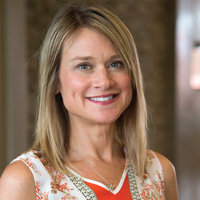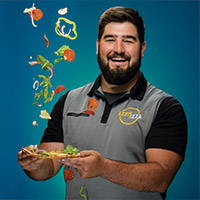Maintaining Health Resolutions
HHS experts offer advice on staying the course for your New Year's goals.

Collaborators Laura Sands, Cleveland Shields, and Melissa Franks. (Photo by Mark Simons)
To optimize success:
Partner up
Regardless of your goals for a healthy lifestyle change, studies show that the buddy system could help maximize your results. One collaborative project involving HHS researchers from several areas focused on married partners and their readiness to eat a healthier diet, lose weight and get more exercise. Melissa Franks, assistant professor of human development and family studies, posed the question: "Is your path to change in any way associated with your partner's?"
Franks, Cleveland Shields, associate professor of human development and family studies, and Laura Sands, the Katherine Birck Professor of Nursing, were among the authors of "I Will if You Will: Similarity in Married Partners' Readiness to Change Health Risk Behaviors," published in Health Education & Behavior in 2012.
With nearly 2,000 couples surveyed, husbands and wives reported on their confidence to make positive changes based on their partners' readiness to make a similar change. As you might suspect, confidence levels lessened when people felt their partners were not on the same page. "Yes, individuals may want to make changes," Franks says. "But their success may depend, in part, on where their partner is."
On money matters: Borrower beware
On the financial front, personal finances can affect the collective health and happiness of any household. David Evans, an Extension specialist from consumer sciences, recommends not getting too wrapped up in the economics. But debt reduction is a must. "If you have an account balance that can be paid off in the next few months, pay it down to zero before any other account and pat yourself on the back," he says."
Next, Evans suggests paying off active credit cards in descending order, without compiling any new debt. "Putting active cards in a bag of water and into the freezer is an old, but useful trick. The resulting block of ice makes access to your credit cards a lot more challenging," he says. "You really need to be in trouble to justify that much inconvenience."
Once you've gotten your finances under control, it's time to find a certified financial planner to start saving for the future. The liberation from throwing good money after bad money in the form of high interest rates is a sound payoff for any consumer.
Evans is part of a renowned HHS Extension program that takes research-based programming straight to the people who need it most. "Some of our most popular programs touch thousands of lives every year throughout Indiana and across the United States," he says.
Like any good lifelong learning plan, the programs coming out of consumer science are tailored for the range of ages. "Captain Cash" introduces the ideas of financial responsibility to third-graders while "Where Does Your Money Go?" teaches adults how to prepare for unexpected expenses.
And whether you're concerned with the bottom line of improved finances or having a smaller waistline, it all starts with having a good plan of action.











